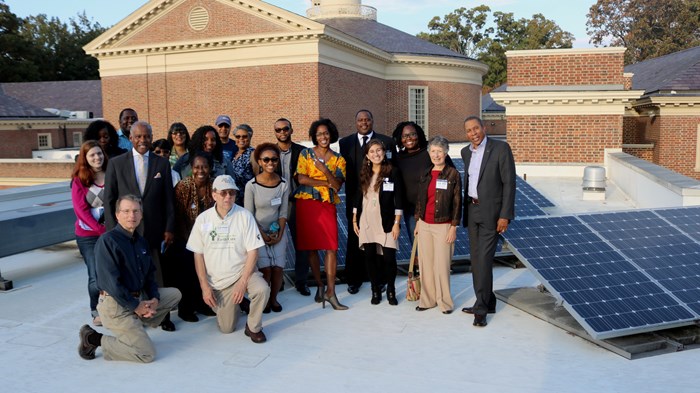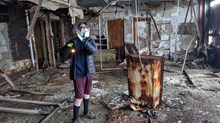How 1,000 Black Churches Are Caring For the Earth

When Rev. Dr. Ambrose Carroll joined with other U.S. leaders around environmental issues, he didn’t see people who looked like him — Black brothers and sisters of faith — at the table. Since the pastor founded Green The Church to amplify the efforts of Black churches 10 years ago, the organization has grown to include 1,000 Black congregations across the U.S. who are taking environmental action — from preaching sermons about creation care, to installing solar panels and growing community gardens, to influencing national policy.
We spoke with Kim Noble, Green The Church’s chief operating officer, about how the Black Church is “going green.” This conversation has been edited for length.
Sarah Holcomb: What is the purpose of “Green The Church”?
Kim Noble: When we think of climate change and pollution, those who are most impacted are low-income communities and communities of color. Black churches are located in these communities. These folks were hit first and worst. But they're responded to least and last. So we wanted to bring our voices to the table, to see what we can do to make a change.
Our mission is to create a cadre of Black church communities. We're committed to green theology, promoting sustainable practices and communities, and helping to build powerful political and economic change. We see ourselves sitting at the intersection between the [environmental] movement and the Black Church. We normally host an annual Green The Church Summit, and last year we established an Ambassador Institute, where we're training theologians and community organizers [through virtual events].
SH: How are Black congregations around the country “greening” the Church?
KN: There are many Black churches doing amazing work, and we want to bring visibility to it. For example, near Friendship West Baptist Church in Dallas, Texas, there’s a place where they dump old shingles into a Black neighborhood. It’s emitting toxins in the air, causing people to get sick. The church is shining a light on that. Other congregations are involved in similar fights throughout the country.
I always say that Black folks were some of the original conservationists. That's how we were raised, to make something out of nothing—utilizing our resources and repurposing them if we need to. We may talk about it differently—sitting on the porch with my dad, we didn't talk about “climate change,” but we talked about the weather changing from what he had known as a young boy. We didn't think of ourselves as conservationists, but we didn't throw anything away. Some churches don't talk about [environmental issues as explicitly], but they’ve still been connected to the movement. I think we need to continue these conversations and acknowledge they’ve been going on for a very long time.
SH: Rev. Carroll describes the Black Church as "the sleeping giant.” Can you explain what that means?
KN: It means that we've been around a long time, and we're a force to be reckoned with. There's never been a successful social justice movement without the presence, will, and power of the Black Church behind it. Communities might be struggling, but one thing that we’ve been centralized around is that church. We sold chicken dinners, had fish fries, car washes, whatever it took —but that building gets paid for. That is an asset that we own. There is power and equity in that.
These church buildings need to be retrofitted. We need to be good stewards over the buildings that God blessed us with. How? We want to make sure they’re energy efficient. We want to make sure congregants are not paying $14,000 a month for their utility bill. We can lower our carbon footprint and care for our communities.
SH: How are churches taking steps towards sustainability?
KN: Churches like Northside Missionary Baptist Church in St. Louis installed solar panels. Jubilee Community Church in St. Louis has a cistern to help with stormwater management. Not only do they catch runoff, now they have a community garden, probably a block wide. In Chicago, Trinity United Church of Christ has "Green Teams" —folks that they're training up in their church to help educate congregants on sustainability. There's countless others.
SH: How does Green The Church’s work tie to racial justice?
KN: Some might think that someone in the inner city wouldn't be interested in climate change or clean energy solutions. But there’s a reason why there isn’t a grocery store in that person’s community. We're still experiencing the repercussions of a redlining, when those in power intentionally decided where they wanted the poorest people. And that’s where they wanted power plants and emitters. It’s all intersectional. It's about our civil rights.
SH: One pillar of your work is “building power for change.” What does that look like?
KN: Change happens at the grassroots—and it means changing unjust policies at the state and federal level. For example, we want policies that allow for community solar energy, and we want to see solar installers from the community who look like the folks who live there. We’re advocating to ensure polluters aren’t coming into already-vulnerable neighborhoods. We've spoken to lawmakers, educating folks around what equity and clean energy solutions look like.
SH: How do you describe the “green theology” that guides these efforts?
KN: Scripture tells us the earth is the Lord's and the fullness thereof, and we should care for our planet and our fellow human beings. Green theology is multifaceted and broad. It’s realizing that the work of tending [to creation] and being responsible is all holy work.
SH: What drew you personally to this work?
KN: I attribute my interest in the environment to my father. He was very observant of nature. He'd say, I've never seen a storm like this or a snow this late in the year. He told me in his 75 years on Earth, he'd seen the climate was changing.
My dad has passed on; my mother's still here. She lives in Atlanta, and her air quality is pretty bad. Just going outside to check her mail is extremely challenging for her. In her mid 80s, she deserves to have clean air to breathe. She's not able to walk very far or to lift her voice. But I try to speak for her and take her spirit with me and my father's in this work. One day when I have grandchildren I want them to know I did all I could to leave a healthy planet for them.
Kim Noble is the Chief Operating Officer for Green The Church (GTC), an initiative that engages Black congregations in the fight against climate change, and for environmental justice. GTC works to expand the role of African American churches as centers for environmental and economic resilience.
Sarah Holcomb covers faith and social and environmental movements. She is the editor for Changemakers, an online publication of Ashoka, as well as a freelance journalist whose work has been featured in CT, The New Humanitarian, Next City, and others. Sarah graduated from Wheaton College (IL), where she studied journalism and Human Needs and Global Resources, and currently lives in the D.C. area.
The Better Samaritan is a part of CT's
Blog Forum. Support the work of CT.
Subscribe and get one year free.
The views of the blogger do not necessarily reflect those of Christianity Today.






















